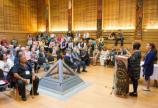2016 CUVIC conference brings community and unviersity together
From April 27-29, UVic hosted CUVIC 2016, the second Community-University-Victoria conference. In response to the Truth and Reconciliation Commission of Canada’s Calls to Action, this year’s conference theme was reconciliation, innovation and transformation through engagement. 220 delegates from as far away as Nova Scotia and Saskatchewan gathered to share the ways that community and university are responding to the Calls to Action.
Residential school survivors, as well as representatives from 18 First Nations, 12 post-secondary institutions, local governments and community organizations attended the conference. Four panel sessions were held on the topics of child welfare, health, justice, and language and culture. Delegates also gave 40 different presentations on community and university research projects and initiatives, including community collaborations on Penelakut Island, revitalizing Indigenous languages and Indigenous legal traditions among Secw "Times New Roman";mso-bidi-font-family:"Times New Roman"" lang="EN-CA">épemc communities.
Delegate feedback on the conference was overwhelmingly positive—it was clear that the strength of the university’s response to the TRC Calls to Action comes from its partnership with, and not separation from, the important work being done in community.
Collaborating across distance, time and above all, worldview, is one of the great challenges facing academic and Indigenous communities as we engage in the work of reconciliation” according to Simon Owen, CUVIC presenter and Senior Researcher with UVic’s Indigenous Law Research Unit (ILRU). “Presenting at CUVIC allowed ILRU and Shuswap Nation Tribal Council to share the worth and reward of this challenge in a supportive, enriching environment. Attending the conference has strengthened our commitment and capacity to do this work together.”
Listening to community is also helping UVic discover new ways to strengthen support for Indigenous students, faculty and staff, and to learn from its relationships with Indigenous community.
“When the TRC released its calls to action, UVic redoubled its focus to become a leader and partner in reconciliation,” says Vice-President Academic and Provost Dr. Valerie Kuehne. “At CUVIC, we were impacted by the stories shared by residential school survivors and their families about the ongoing impact of colonialism on Indigenous communities, and were inspired by delegates who are working so hard to move in a good way towards reconciliation.”
One of the ways that UVic is moving forward is through the development of its first Indigenous Plan, which is currently in the consultation phase. This plan is informed by the goals, aspirations and concerns of Indigenous students, faculty and community at large, and its content reflects the stories shared at CUVIC—stories that motivate UVic to redouble its efforts to create a community that includes indigenous ways of being, learning and knowing. The plan aims to raise the entire UVic community’s awareness about the history of abuse relating to Indigenous peoples of Canada and the enduring negative impacts from colonialism. This is one step towards dismantling the systemic and cultural barriers that prevent meaningful change.
A summary of the conference as well as a photo gallery and some delegate presentations are now available at uvic.ca/cuvic2016. The next CUVIC conference will take place in 2018.

